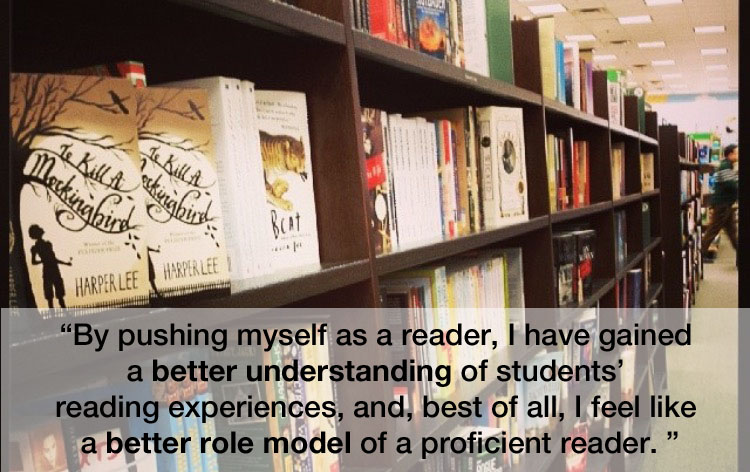Last year, while mentoring a second-year middle school English teacher, I complimented her knowledge of books for young adults. I was impressed by the expertise she demonstrated when making personal book recommendations to each of her seventh graders, helping them develop into successful independent readers. I asked her how she knew about all the different titles.
“Well, I read them,” she replied.
“You really read all of those YA books?” I asked in awe.
“I feel like it’s my job,” she said.
And she was absolutely right.
In every version of the National Board standards, for each certification area, there are several pages about the Five Core Propositions. The second of these propositions is: Teachers Know The Subjects They Teach and How to Teach Those Subjects to Students. This proposition inspires me to continue developing specialized knowledge of my subject and pedagogical methods. Additionally, they also demand that I am adept at teaching students how to solve challenging problems.
Reflecting on my mentee’s comment as well as on my understanding of the core propositions, I began to formulate a professional goal for myself: to push myself as a reader by reading books I would not normally read.
To meet this goal, I developed a 3-part plan of how to push myself as a reader.
The first part involved reading challenging books, and reflecting on the strategies I use to comprehend them. I had actually started this part of my goal in 2012, by signing up for a course through The Examined Life in which I studied classical literature. I was required to read The Iliad and The Odyssey. It was challenging, but I developed my own strategy for approaching these texts. I started by reading the SparkNotes online and mapping out the plot for each section. As I read the required texts, I checked off main plot points as I went, which allowed me to also enjoy the language rather than expending my mental energy figuring out the story.

I showed my 7th and 8th grade ESL students my readers’ notebook from the course, as well as the annotations I had made in my copies of the books and readings. They were so interested in looking at my readers’ notebook that they asked for me to pass it around the room. It felt very affirming that I was able to authentically model strategic reading for my students.
The next step in meeting my goal was to start reading young adult fiction. I used to avoid fiction, but now I find myself enjoying young adult novels, which I can easily breeze through in a day. It’s also an easy way to help me reach my Goodreads challenge of 25 books per year.
Although I am currently in a leadership role in which I primarily coach teachers and facilitate special education meetings, one of the highlights of my job is accompanying our seventh grade students to the library every two weeks. They affectionately refer to me as “the Book Lady,” and I’ve demonstrated some impressive speed as I literally sprint around the library to help the students select their books. Eighteen months ago, when my knowledge of young adult fiction was fairly limited, I wouldn’t have been able to assist them as well.
The third part of my plan involves reading books in Spanish. Though I can speak Spanish well enough to be given the compliment casi Latina (“almost Latina”) by some parents at my school, my Spanish literacy skills and vocabulary are very much a work in progress. I am proud to say that I completed a full novel in Spanish – albeit at an upper elementary level – last summer. The concentration it took for my second language was so much greater than I would need in my first language, and this experience provided me with empathy and understanding of the mental exhaustion that takes place when reading in a second language.
By pushing myself as a reader, I have gained a better understanding of students’ reading experiences, and, best of all, I feel like a better role model of a proficient reader. I take great pleasure in my role as “The Book Lady”, and the students have even figured out that I can’t resist ordering books that they request when they show me honor roll report cards, improvements on behavior plans, or progress with homework assignment completion.
Through my own reading goals, I am demonstrating the continual learning required for accomplished teaching practice.
